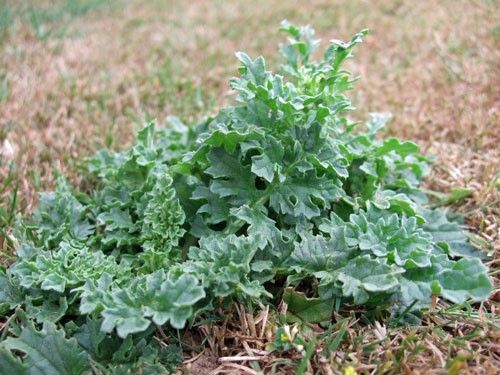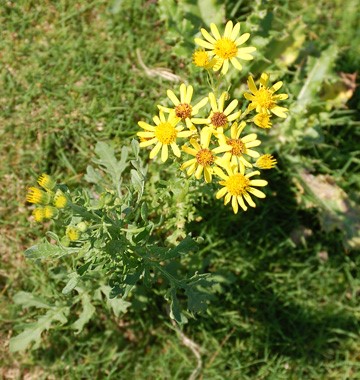What is Ragwort Poisoning?
Ragwort (Senecio jacobea) (see picture 1 and picture 2) is a weed that is commonly found in pasture and grass verges throughout the UK. Ragwort contains a toxin (pyrrolizidine alkaloid). This toxin causes damage to the liver of a number of animals, including horses and donkeys if ingested. Most animals tend to avoid eating Ragwort as it is not particularly palatable, although if food is scarce or there are a large number of Ragwort plants present within the pasture, horses may be forced to eat it. The toxin (pyrrolizidine alkaloid) is very stable and remains toxic even when the dried plant is incorporated into hay.
Picture 1: Immature Ragwort. Picture 2: Flowering Ragwort.


What causes ragwort poisoning?
The most common cause of Ragwort poisoning is as a result of chronic (long-term) ingestion of the weed. Unfortunately, this is often through the ingestion of hay made from a pasture containing ragwort. The dried ragwort is more palatable, and “disguised” within the hay, meaning that horses unwittingly eat it.
What are the signs and symptoms of ragwort poisoning?
There are two types of poisoning with Ragwort – acute (immediate) and chronic (long-term). The acute form is not commonly seen, as large quantities of Ragwort need to be eaten, but if it does occur the first sign is often sudden death of the horse or pony.
Chronic Ragwort poisoning is more commonly seen compared to the acute form. The clinical signs of poisoning are usually not observed until weeks or months after ingestion of the Ragwort. Small doses of the toxin gradually accumulate in the horse's liver where it causes damage to the liver cells and scarring of the liver, with the liver shrinking in size over time. As the liver has large functional reserves, the clinical signs of Ragwort poisoning only become apparent once the liver has become so damaged that it no longer has any functional reserve left. These signs can often come on suddenly, although in some horses and ponies, mild illness can precede more severe symptoms. The clinical signs of chronic Ragwort poisoning include loss of appetite, depression, diarrhoea, weight loss, sensitivity to sunlight and jaundice (yellow colour to skin or eyes, although jaundice is often one of the less obvious signs in horses suffering from liver disease). As the liver is responsible for filtering the body’s blood of many substances, when it stops functioning correctly these compounds can affect the brain and affected animals can develop neurological symptoms such as weakness, circling and head pressing. This is known as hepatic encephalopathy.
How can I prevent ragwort poisoning?
Ragwort is a biennial plant, which in its first year forms flat green rosettes. In the second year it becomes much taller and produces characteristic yellow flowers (see pictures above). The only reliable method of prevention is to remove the weed from pasture. The plants should be removed; including roots, bagged in plastic and disposed of away from livestock. It is important to ensure that animals have no access, whatsoever, to any Ragwort plants, even if dried as they can still be poisonous. The toxin can also be absorbed through the skin of humans so it is important that impervious gloves are worn. Plants on adjacent land should be removed to avoid the spreading of seed back into your paddocks. Always ensure that there is adequate grazing or alternative food sources such as hay, so that your horse or pony is not tempted to eat any ragwort that may have been missed. Herbicidal sprays are available for the control of ragwort and advice can be sought from your local farm merchant on the most appropriate one.
There is a DEFRA Code of Practice to prevent the spread of ragwort. Those who disregard the need for the weed's control can face prosecution by the government (Ragwort Control Act 2004).